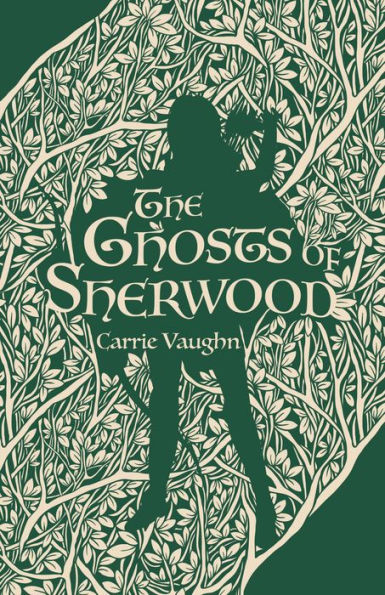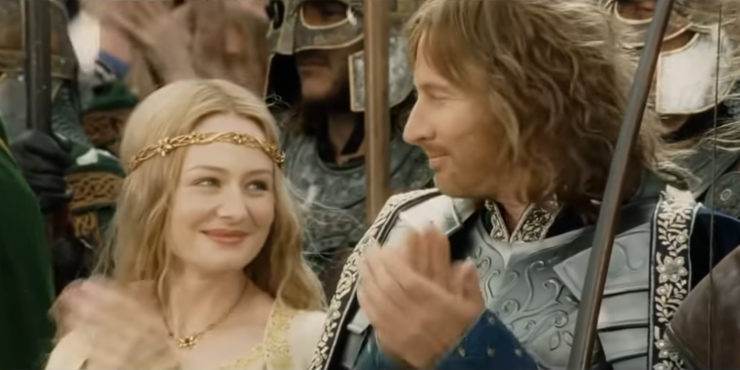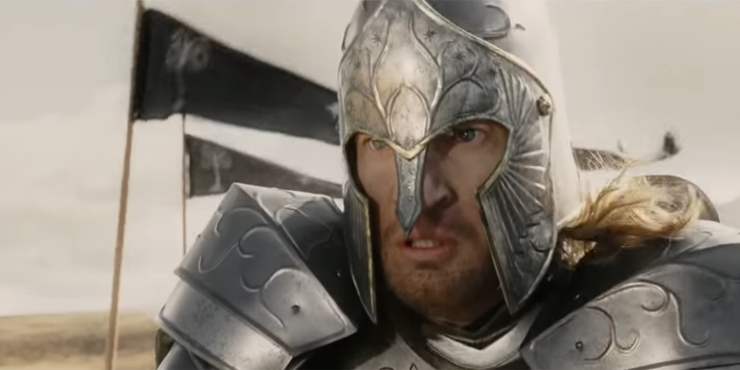For the last week, I’ve been thinking about this piece from The Cut, which poses the question, “Are You an Aragorn Girl or a Legolas Girl?” Which led me to some questions of my own:
What kind of girl (or guy, or person) were you when you first loved someone from the safe distance of fiction?
Did you dream big? Did you aim high?
Or did you see yourself, your plain ol’ human self, with clear eyes and know you were never meant for the center of the Fellowship, but that could never be the the only Fellowship in a world as big as Middle-earth. Once you aged out of being a Legolas girl and really thought about Aragon and his king-sized baggage, there could be only one choice left for someone who likes the side quests more than the main mission.
If so, then maybe you’re a Faramir girl.*
If you’re of a certain age, you grew up on the Lord of the Rings movies and watched the trilogy over the course of three very formative years. I’m a bit older, so I feel Jurassic Park was that film for me. “Yay! Dinosaurs!… Why do I keep looking at shirtless Jeff Goldblum when there are dinosaurs?” I wondered in my preteen, proto-Tina Belcher confusion.
But I was probably an outlier; there’s a reason “Legolas girls” are absolutely a thing. It’s a tale as old as time. Legolas is beautiful, androgynous as a boy band (or goth band) member, safe, and clean-cut. And that’s valid! But he’s elf royalty, and when combined with his immortality, too aloof. Legolas will never understand your anxiety, will never empathize with your existential dread or the heartbreaking frustration of a bad hair day. (Note: this also applies to Galadriel girls.)
Anyway, why would you even pick Legolas as your elf boyfriend when Elrond and his library are right there?
Aragorn, though. Now that’s a man. Literally, he is a Man of the line of Dúnedain, which makes him already preternaturally extra. From his smoldering first appearance in The Prancing Pony, he exudes that grungy ranger goodness with the perpetually wet hair of a ’90s wrestler. He’s long-lived, but not immortal. He’s Seen Things. He’s Done Things…dark, unfortunate things in those forests of Rhovanion. In the R-rated version of Lord of the Rings that plays out in your teenage brain, Aragon surely has sex. Then you get to Rivendell and it turns out he’s royalty, too. Can anyone just… be who they are? I don’t have a grand world-saving destiny. Probably. Maybe you do, reading this, but the odds are pretty slim.
Naturally Aragorn’s got a girlfriend and because this is Tolkien, who else can be waiting like a prize at the end of a secret king’s journey but a perfect, beautiful elf princess?

When another mysterious, hooded ranger walked onscreen, I sat up in my theater seat. Who was this young captain with an eerie dream of his brother Boromir’s death and a friendship with Gandalf? Sure, actor David Wenham was once voted Australia’s sexiest man, but my love for this other man of Gondor didn’t begin in earnest until I read the books. Movie-Faramir’s got nothing on Book-Faramir, aside from perfectly feathered ginger hair and a memorable profile.
I never read Tolkien in high school. I thought I was far too cool and too dark for hobbits. (I wasn’t.) But I came to the Lord of the Rings movies as a huge Peter Jackson nerd and promptly fell in love with the beauty of New Zealand and the battle between good and evil that seemed comfortably clear-cut in the months after 9/11. I watched the movies amazingly unspoiled. I read each book only after I saw the movie. And I didn’t truly appreciate Faramir’s role in the world of Middle-earth until I saw him through Pippin’s eyes in The Return of the King:
- Here was one with an air of high nobility such as Aragorn at times revealed, less high perhaps, yet also less incalculable and remote: one of the Kings of Men born into a later time, but touched with the wisdom and sadness of the Eldar. He knew now why Beregond spoke his name with love. He was a captain that men would follow, that he would follow, even under the shadow of the black wings.
-
—The Return of the King, Book 5, Chapter IV: “The Siege of Gondor”
Faramir is the best of both the human and Elvish worlds.
While his shitty father Denethor lavished more praise—and pressure—on his older brother, Faramir turned to his passions. As the son of the Steward of Gondor, he was well-educated in warfare and politics and when we meet him in Ithilien, he has his company’s utmost trust. Yet his favorite studies were the things he believed men should fight to defend: art, music, and literature. Like Aragorn, Faramir’s innate nobility and otherworldiness reflected his own, more distant, Númenorean ancestors, and showed truer in Faramir than in jock-boy Boromir.
Faramir was “a Wizard’s pupil,” after all.
Neglected by his own father, it isn’t hard to imagine a young Faramir latching onto Gandalf’s every word when the Istar visited Minas Tirith’s library and developing his own moral philosophy under the teachings of the Third Age’s wisest voice. This is the Faramir who can face the One Ring and decide he “would not take this thing, if it lay by the highway.” The movies did Faramir so wrong, it’s true.

But Faramir really shines in the Houses of Healing.
You can’t be a Faramir girl without also being an Éowyn girl.
Yes, Éowyn didn’t really want Aragorn; she wanted the idea of Aragorn and the glory of battle. But, come on, she also wanted Aragorn and you can instantly read the look in her eyes when she hears about Arwen. How can I compete with that? Some might say it’s low self-esteem, that insecurity is unattractive, but so what? It’s also highly relatable. Arwen’s grace elevates her to a near-mythological figure and it’s a perfect counterbalance for Aragorn and his long road to reclaim his birthright as the King of Gondor. Éowyn never stood a chance against the power of such archetypes and neither would you.
Buy the Book


The Ghosts of Sherwood
You know who isn’t in competition with anyone? Faramir.
You know who is perfectly fine with being someone’s second choice? Faramir.
He’s been a distant second in his father’s heart his entire life and never resented Boromir for it; they were best friends. Further, it is literally his duty as steward to step aside at the return of the King of Gondor and he does it without hesitation. He does it with the understanding of the rule of law, in recognition of Aragorn’s proven wisdom and abilities to lead and, most importantly, to heal, and with genuine gladness for the coming restoration of his beloved city. That’s a class act.
But what really, really makes Faramir something special is his patience and compassion for Éowyn when he meets her at the lowest point of her life, after the Pelennor Fields and the death of her uncle Thèoden. The endless endings of ROTK make the shieldmaiden look fickle in her affections, though less so in the movie’s extended cut. But in the books, Éowyn has space to grieve the loss of everything she thought she could be. And with Faramir, she finds someone to talk to.
As someone who’s lived adjacent to a greatness but never desired it for the sake of having it, Faramir is in a position to see the whole of a situation. He’s known rejection, loneliness, and griefs fresh and old. He knows Éowyn loved Aragorn as more than a king. I mean, her thirst was visible from the top of Mount Doom… But he can admit it. It doesn’t bother him. He accepts Éowyn in her sorrow and her bravery and with the knowledge that she’s had a past before him. And he does all this pining for her without being creepy about it! He believes in hope and that while they are together, the Shadow of Sauron cannot touch them. And it is quite literally true.

Tolkien said that the character he most felt he resembled was Faramir, a warrior who hates war. Faramir showed up quite unexpectedly in a burst of inspiration and the author liked this reluctant soldier so much, he gave Faramir a recurring dream that once belonged to Tolkien’s mother: that of a great wave washing over a city. This dark pall of death and uncertainty over Minas Tirith retreats not during Aragorn’s coronation, but when Faramir first kisses Éowyn:
And so they stood on the walls of the City of Gondor, and a great wind rose and blew… And the Shadow departed, and the Sun was unveiled, and light leaped forth… and in all the houses of the City men sang for the joy that welled up in their hearts from what source they could not tell
—The Return of the King, Book 6, Chapter V: “The Steward and the King”
Faramir is an epic kisser! This is canon.
Faramir feels more complicated and more real than most of Tolkien’s characters, despite having less time in the story. It’s an unfair punchline that this noble leader is seen as some kind of beta-man, less than Aragorn and Boromir, and more unfair to malign him for a rough childhood that was not in his control. He’s clearly a respected warrior; everyone he meets recognizes this. Yet Faramir’s ultimate destiny is to have a nice garden, raise a happy family with the love of his life, and be a dutiful citizen. It’s an achievement that’s no less impressive for its simplicity. If being kind, patient, and wise were so easy, well, the world would be a better place. And if everyone kissed as well as Faramir, obviously that would be even better.
Forget those fancy kings and elves.
Look for your Steward.
*I’m using the word “girl” here because that’s how the original article framed the argument, and it’s a term I’m comfortable using in relation to myself, but obviously this phenomenon isn’t limited by sex or gender (as Sangeeta Singh-Kurtz also points out in that piece).
Theresa DeLucci likes big noses and she cannot lie. Look for her on the fifth day, at dawn, to the East. Or just on Twitter.










